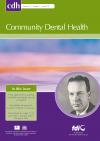Community Dental Health

- Cover Date:
- June 2010
- Print ISSN:
- 0265 539X
- Vol:
- 27
- Issue:
- 2
Effectiveness of structured comprehensive paediatric oral health education for parents of children less than two years of age in Germany
Objective: To examine the effectiveness of expanding and improving oral health education in a clinical setting. Research design Controlled prospective intervention study. Intervention Structured comprehensive oral health education (SC-OHE) supported by written information. was performed by 36 clinicians in all of the 30 specialist paediatric practices in the city and the administrative district of Kassel, central Germany. Participants Parents of all children attending the practices for health examinations. SC-OHE was tested in two intervention groups (IG), one with a mean child age of seven months and another with a mean child age of 24 months. The SC-OHE content was adapted to the respective age groups. Control group (CG) subjects were recruited in a similar region in northern Germany and received conventional oral health education only. This consisted of comparable topics but was less comprehensive than SC-OHE. The two IGs comprised 2,170 children; the two age-matched CGs 2,040. Outcome measures Parental knowledge, attitudes and behaviour relevant to decreasing the risk of early childhood caries (ECC) development. The outcomes were measured by questionnaires sent to the parents. Results The response rate was 88%. On average, control group paediatricians provided 2.1 information items at each child examination whereas the intervention group provided 3.8 items. Parental knowledge increased by 23%. Self-efficacy and attitudes remained unchanged. 41% of 7-month-olds in the CG received baby bottles with cariogenic content during daytime as opposed to 32% in the IG (p<0.001); however, bottle use at night was unchanged. IG parents were less likely to add sugar to puréed baby food of the 7-month-olds. In 24-month-old children, the frequent consumption of cariogenic beverages in the daytime decreased slightly (CG 66%, IG 61%, p<0.001), but five other nutritional behaviours, fluoride use and tooth brushing remained unchanged. Conclusions Primary care providers can be trained to perform SC-OHE that improves parental oral health knowledge. SC-OHE provided by clinicians alone will not be capable of influencing crucial oral health behaviours in such a way that prevents ECC.
Key words: Dental caries, early childhood caries, health education, intervention study, nursing bottle caries, paediatric dentistry.
- Article Price
- £15.00
- Institution Article Price
- £
- Page Start
- 74
- Page End
- 80
- Authors
- H. Strippel
Articles from this issue
- Title
- Pg. Start
- Pg. End
- A health equity methodology for auditing oral health and NHS General Dental Services in Sheffield, England.
- 68
- 73
- Effectiveness of structured comprehensive paediatric oral health education for parents of children less than two years of age in Germany
- 74
- 80
- Reliability analysis of visual examinations carried out by schoolteachers and a dental assistant in the detection of dental caries.
- 89
- 93
- Caries experience and oral health behaviour among 11 – 13-year-olds: an ecological study of data from 27 European countries, Israel, Canada and USA
- 102
- 108
- Development of a measure of childhood information learning experiences related to dental anxiety
- 122
- 128
